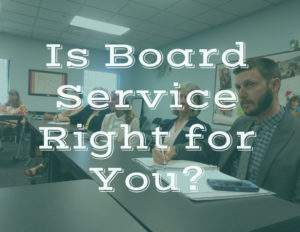 Joining a nonprofit board is often represented as the ultimate way to serve an organization, but it isn’t always the best option for everyone. Here are some considerations:
Joining a nonprofit board is often represented as the ultimate way to serve an organization, but it isn’t always the best option for everyone. Here are some considerations:
Do you prefer working in teams or alone?
All good boards function as strong teams of people who get things done together. This involves plenty of meetings and robust discussion. Do you enjoy meetings or are you sick and tired of them? I have a friend who has no interest in going to any more meetings in his life. He just wants to get work done. He is a fantastic volunteer on work days at a nonprofit with me, and always willing to share insightful comments while we work. Everyone benefits in this situation.
Is your skill set something that lends itself to working alone?
Would you prefer to help organizations out by focusing on upgrading their technology, for example? You might want to volunteer to work with staff in that specific area, not by attending meetings to discuss the strategic direction of the organization.
Do you have control over your schedule?
None of us have complete control over our schedule, but if you have a job where you are frequently required to attend last minute meetings, or you care for family members with serious health problems, you may not be able to make board service a priority right now. Consistent attendance at board meetings and other events is key to a board’s success.
Are you willing to fundraise?
Do you care enough about the organization to ask other people for money? You may not be required to fundraise while you are on a board, but I can guarantee that you will be asked to promote the organization to your network. Is this a cause and nonprofit that you are willing to do that? Are you already promoting them to your friends and family? Board members need to really care about the organizations they serve, and this is a good test to see if it is right for you.
Those are questions about you and your willingness and ability to serve. Now, what do you need to ask about the organization to make sure it is a good fit for you? Here’s a few ideas:
What are the expectations of board members? How much time will you need to commit? Do they have minimum donation requirements? Are you expected to help with fundraising? Don’t let them tell you the commitment is just an hour a month for the board meeting. You know the true answer should be much more than that.
When was the last strategic planning process and what is the progress on that plan? When was the last audit and what were the findings? Is there a succession plan in place for the executive director? Does the organization have directors and officers insurance to protect the assets of the board members? What is the current financial situation? What are the largest revenue sources and expenses? Do board members have term limits? Are there any serious challenges that the organization is currently facing?
For those who have been recruited to join a board, here are a few more possible questions. Why does organization want you on their board? (There should be a clear answer showing that they have thought about it.) How soon are elections – are they scrambling to fill slots in two weeks? Don’t let someone rush you into joining a board. It’s a commitment that requires careful consideration.
If you have a hard time getting answers to these questions, that should be a red flag, of course. I also recommend talking to an existing board member to get their input on what being on the board is really like.
By all means, join a board if you want to. It’s a valuable way to serve and not one that everyone can or wants to do. Nonprofits need engaged, thoughtful and bright board members. They just need them to do their due diligence before joining so that it is the best experience for everyone.
Want to talk more about being a board member? Contact me and let’s chat.
